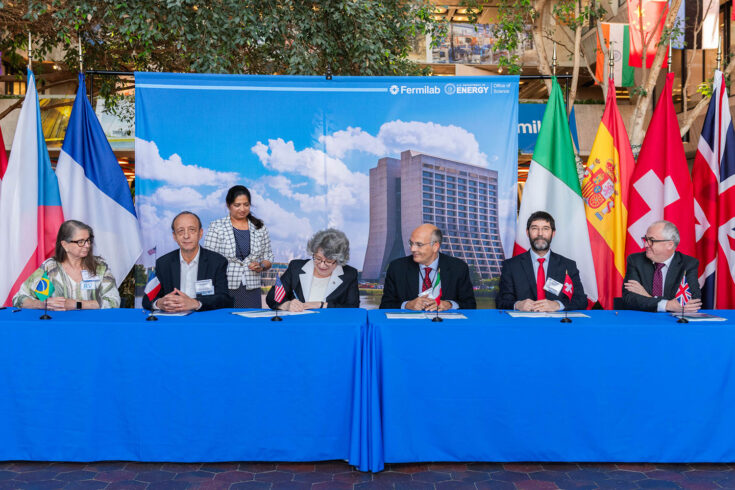DUNE will be hosted by the US facility, Fermilab and will seek to reveal the secrets of neutrinos, the most abundant matter particles in the Universe.
This latest agreement marks an important step towards providing the advanced, next-generation technology and hardware required for the experiment to begin.
New scientific methods
Although neutrinos have long been established as an essential building block of the Universe, they remain largely mysterious to particle physicists.
In order to conduct a comprehensive study of their behaviour, construction of new kinds of particle detectors is necessary, to be implemented a mile underground in South Dakota.
The DUNE experiment will fire neutrinos at these detectors from the Long Baseline Neutrino Facility (LBNF) at Fermilab near Chicago over a distance of 1,300 kilometres.
The experiment will analyse how the neutrinos change as a result of their travel through the Earth.
Neutrinos are known to enter different states as they travel long distances, and it is this change in state that scientists will study.
It is hoped that in doing so, they will:
- reveal insights into the fundamental properties of neutrinos
- answer questions such as why neutrinos are so abundant and whether they could be the reason the Universe is made of matter
Global science
DUNE is a mega science experiment that requires mass international collaboration to be achieved. The DUNE collaboration comprises more than 1,400 scientists and engineers from over 200 research institutions.
In this latest agreement, representatives of funding agencies from eight countries, as well as CERN have signed a memorandum of understanding (MOU), reaffirming their commitment to contribute to the experiment.
This includes the UK Science and Technology Facilities Council (STFC) and representatives from:
- Brazil
- Canada
- CERN
- Czechia
- France
- Italy
- Spain
- Switzerland
UK expertise
In signing the agreement, STFC has committed to:
- supporting construction of the anode plane assemblies of the South Dakota detector
- supporting development of the DUNE data acquisition system
- providing critical hardware to both detectors
This will be in addition to ongoing STFC support for DUNE through programmes such as the STFC Daresbury Laboratory DUNE factory and STFC’s contributions to the Proton Improvement Plan-II enhancement to the Fermilab accelerator complex.
Transforming physics
Professor Mark Thomson, STFC Executive Chair, who attended the signing on behalf of the UK, said:
The DUNE experiment is set to revolutionise our understanding of the role of neutrinos in particle physics.
It also underscores the incredible potential of working together as an international community to address the big questions about the fundamental nature of the Universe.
The UK has been one of the main partners in DUNE right from its conception and, on behalf of the UK research community, STFC is delighted to restate our commitment to provide support and cutting-edge hardware that will help unravel the mysteries of neutrinos.
A momentous occasion
Professor Lia Merminga, Fermilab Director, said:
The signing of this MOU is a watershed moment formalising our partnering countries’ commitment to constructing a best-in-class neutrino experiment.
I extend my sincerest gratitude for their contributions, commitment, and excellence.
Every facet of this experiment is powered by international collaborations and partnerships.
Further information
About STFC’s contribution to DUNE
In 2017, the UK government announced the investment of £65 million into the LBNF at Fermilab and DUNE.
This is one of the three UK projects supported by this funding.
There are two other projects for the LBNF or DUNE experiment that the UK is involved in:
- Proton Improvement Plan-II at STFC’s Daresbury Laboratory
- the liquid argon DUNE detector, which involves a large collaboration of UK universities and includes the Anode Plane Assemblies (APA) factory also at Daresbury
APAs will read out the tiny electrical signals of neutrino interactions with the liquid argon.
They are large and made of thousands of turns of wire, around 24 kilometres for each APA.
Daresbury Laboratory is challenged with the task of producing not one, but 150 APAs with millimetre precision.

